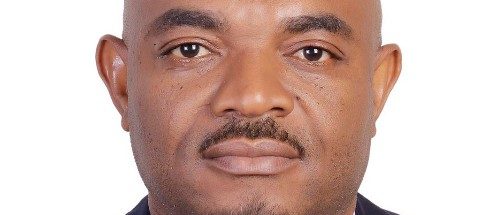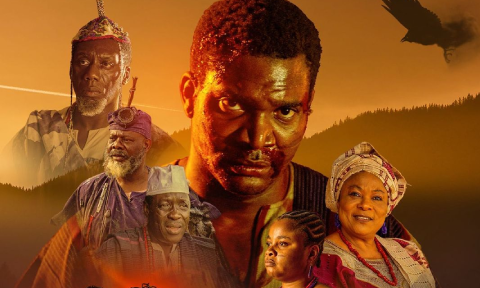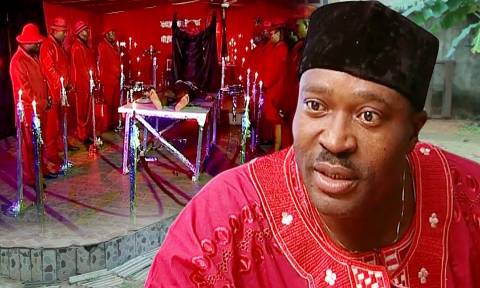
Francis Onwochei is an actor, scriptwriter and a film maker. He is the producer of the award winning film ‘Saving Alero’. ‘He also produced Raging Storm, Claws Of A Lion’ and others. Before the advent of Nollywood, he was already a remarkable actor, one of the most versatile actors on stage in the 80s. In this interview with TONY OKUYEME, Onwochei speaks on his days on stage and television, why there is a lull in live theatre as well as on Nigeria’s poor performance in the last two editions of the African Movie Academy Awards (AMAA). He also offers insight into the decline in school drama productions.
For most people, the name Francis Onwochei strikes a chord due to his many roles in films both as an actor and as a producer. Not many are however aware that the highly talented actor from Ubulu-Uku in Aniocha Local Government Area of Delta State, was a very priced jewel on stage. Many people will easily recall his performance in the stage adaptation of Chinua Achebe’s Things Fall Apart, staged at the National Theatre, Iganmu, Lagos. He was also a regular face on television, featuring in most of the popular drama series in the 80s to the early 90s. When the Nigerian movie industry began and he like other artistes joined the industry, it appeared he had called it quits with live theatre. In this encounter, Onwochei recalled his early days in the theatre with palpable nostalgia, noting that it was a time of vibrant theatre activities, when it was something of great joy and fulfillment to be on stage. All that has however changed now, he says.
“I started my theatre career in the early 80s in Anansa Play House, based at the National Theatre, Iganmu, Lagos. At that time in Lagos there was a vibrant theatre. Some of these theatre companies include PEC Repertory Theatre, Anansa Play House, Ajo Production, Komikas Play House and others. Most of us got our baptism on live theatre in Anansa Play House. And at that time we did a lot of plays. We traveled quite a lot, taking plays all around Nigeria, visiting a lot of places. Many of these plays were directed by the head of Anansa Play House, Bassey Effiong, presently the Director of the Cross River State Council for Arts and Culture. He was assisted by Backlays Ayakoroma who is the current Executive Secretary of the National Institute for Cultural Orientation (NICO). Some of my colleagues in Anansa Play House in those days include Richard Mofe Damijo (RMD), Segun Arinze, Mike Odiachi, Lara Akinsola and a lot of other important practitioners today.
“At that time, it was really serious the things we were doing. It was a brilliant time for us because at that time we got adequate instructions; we got the tutelage; we got the requisite practical training. Theatre performance in English in Lagos was very critical then. It graduated into producing plays sponsored predominantly by Nigeria International Bank (NIB). They huge performances in those days, close to what Charms Plc is doing now with their yearly theatre series. Most of those performances were directed by Bayo Oduneye who later became the Artistic Director of the National Troupe of Nigeria (NTN). Naturally, some of us, myself in particular, took part in a lot of productions with NTN under Bayo Oduneye. We still work with them. We also featured in a lot of productions under Professor Ahmed Yerima as the Artistic Director of NTN. Every now and then, when we find time to engage in the practice of the theatre, the National Troupe of Nigeria (NTN) is where we go to pay homage and give our time to live theatre performance,” Onwochei says.
He noted that in the early 90s, there was a lull in the theatre and naturally, the attraction came for television and film, especially with the introduction of Nollywood. “But even before Nollywood, a lot of us were also acting in various television drama series and serials at the Nigerian Television Authority (NTA). For instance, I acted in a few episodes of The Village Headmaster; but more critically, I was in Drive And Stay Alive – a drama series produced by Lola Fani Kayode. I was in Ripples, Checkmate and before then, I featured in Legacy, a drama series directed by Yomi Layinka. So I was in a lot of that. As I said there was lull in the television drama productions also, and the attraction of film production took over.
At the early stages of Nollywood, I acted in some films. I worked with Chico Ejiro, Zeb Ejiro, Joe Dudu and Zik Zulu Okafor. Some of the films which I took part in include Dead End and Silent Night which became an instant hit upon its release. I was also in Never Again, a film directed by Joe Dudu. I can’t really recall of them now, but I have featured in a lot of films. I must mention that I worked consistently with Tade Ogidan, and in fact, a lot of my training in the motion pictures environment, most of the things that I know in the industry, I learnt from him. I worked with Tade Ogidan in various television programmes – drama, features, documentaries and commercials. I learnt a lot from him; and he also encouraged me to begin to produce some films myself.
According to him, with this encouragement from Ogidan, he decided to give all it takes to produce a film, and it paid off sooner that he had expected. “My major break as a producer came with my production of Raging Storm, which I wrote and also played the lead role, Steve Maduka. This was in 1997. Raging Storm got a lot of positive reviews. And then we went on to produce Final Onslaught which I directed. I also produced Tansi – a biographical feature film on the life and times of late Rev. Father Iwene Tansi. It was commissioned by the Catholic community in Nigeria. After that we did Saving Alero which is a film on widowhood in Nigeria. I now started to really get engaged in the motion picture work doing documentaries, drama series and feature productions both in and outside Nigeria.
Some time in 2003, I felt I needed to acquire more knowledge in the motion picture industry. So I took a course in film and television production in a television training school, Berlin, Germany. This was in 2004. I also attended the Southern Illinois University in Chicago, U.S.A . I have also done various courses on motion picture in South Africa and the U.K. One has over the years acquired structured training in the motion picture environment, which has been so useful in the way that we do our works. I have traversed the international circuit, a lot of them with films. By the time we did Saving Alero and it won the Best Nigerian film at the National Film Festival in 2003, we also won the Best Actress, we went on to participate in several international film festivals and it received a lot of critical acclaim. In 2006, I got a grant from the France Ministry of Foreign Cooperation in the French Embassy to produce my film Claws Of A Lion.”
Onwochei recalled his exploits on stage, especially his performance in Things Fall Apart. “The stage adaptation of Things Fall Apart was one of the most engaging plays that I have done in Nigeria. At a certain time, I played Obierika, Ezeani Okika and another role. In fact, in one of the productions of Things Fall Apart, I played three different roles so distinctly, and one had major reviews all over the national newspapers. So I admit that at the time we were engaged in stage productions we tried to do our best. We were glad that we were appreciated at that time. I still find time to do satge plays once in a while. But as I said, the lure of television came. And don’t forget that one must grow. At that time we were bachelors, young guys just out of school. Now, one is a responsible father with children. The stage unfortunately in Nigeria, well I don’t know how it works in other parts of the world, there is not much payment from stage drama. You can’t go home with anything meaningful. On television, you do little and get so much money. On stage, you do so much and get so little. Therefore, you have to find a way to marry, of these things. So you could see the constant pull to get attracted to the motion picture environment, and that is how it has been.
“Stage drama is truly my first love as an artiste, and although I have been more into the motion picture industry in recent years, I still find time to go back on stage when I am invited by the National Troupe of Nigeria. In the 2007 production of Idemili, a play written and directed by Professor Ahmed Yerima, I played the Monsignor. At the moment there is a lull in live theatre in Nigeria. It is saddening. There are no major and consistent effort at promoting live theatre apart from the National Troupe of Nigeria, Theatre at Terra series by Wole Oguntokun and Patrick Jude- Oteh’s Jos Repertory Theatre, and recently, the Charms Theatre Series. There are many successful playwrights in Nigeria who have written major plays that Nigerians, the youths, our elderly ones too, need to see on stage. We need to see some of these plays because it helps to underline some of those great things in our socio-cultural environment.
School drama productions supported the sustenance of live theatre. It was very critical because students in secondary schools were enjoying the fact that we were doing Shakespearean plays and plays by African writers. And we were able to explain in details what the plays are about and it helped the students in their appreciation of what these plays are about. Don’t forget that at that time also the National Theatre under Col. Tunde Akogun (RTD), now Member of the Federal House of Representative, was very supportive of independent producers. Akogun was the Sole Administrator of Culture then and he initiated the Open Theatre policy whereas an independent producer, aware that there was not much money you were expected to make, they made the Cinema Halls available free for live theatre performances. Today, I don’t know the current management of the National Theatre and what their policy of support is towards live theatre, knowing that when an independent producer, when you do these plays, when students come to see them, the income is barely enough to pay artistes and pay for all the cost of production. Therefore, you must get some of these support all over the place for live theatre to thrive. There is need for the current management of the National Theatre to adopt the Open Theatre policy. This is in addition to corporate organisation coming to support live theatre. That is the only way live theatre can blossom.
Nollywood performance in the last two editions of AMAA
I think I understand the environment very well enough. In fact, when African Movie Academy Awards (AMAA) was set up, I was the first head of the Screener for the first awards. Part of the things I noticed as head of the screener was that 95 percent of the films that we entered for the awards were from Nigerian film makers. And it was my recommendation to the panel to open it up so it can truly have its African feel. Don’t forget that we had a lot of project coming from Nigeria in our films. And once you films from Ghana, Namibia, Kenya, they were very ordinary, very negligible films. What has happened now is growth process. Have we grown? How have we grown? Six years after a major lull affected the Nigerian motion picture industry. I do not know whether Nigerian film makers entered more than 20 films two years ago. I do not know the level of the quality of these 20 films? So naturally, the film from Ghana, Kenya and other African countries who prior to this time were very weak, they raised their standard, better productions values, better scripts, better music and better sound, would dominate the awards. The trend will continue if we as a people do not get our acts together and begin to do good films so that we can get to that level of performance we desire. Nigeria can cause a change to happen if we decide to improve on the time we spend in making our drafts and scripts, the attention we give to the quality of sound and light, acting and directing, and all the various areas of film production.
One of the people that I have identified that have tried to do something that direction is Mahmood Alli Balogun.



















